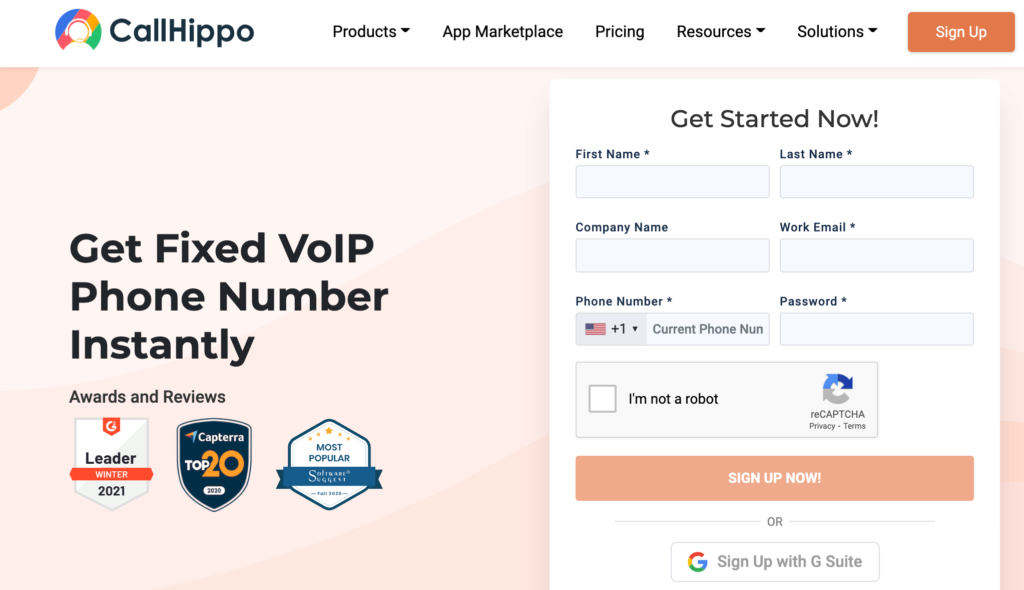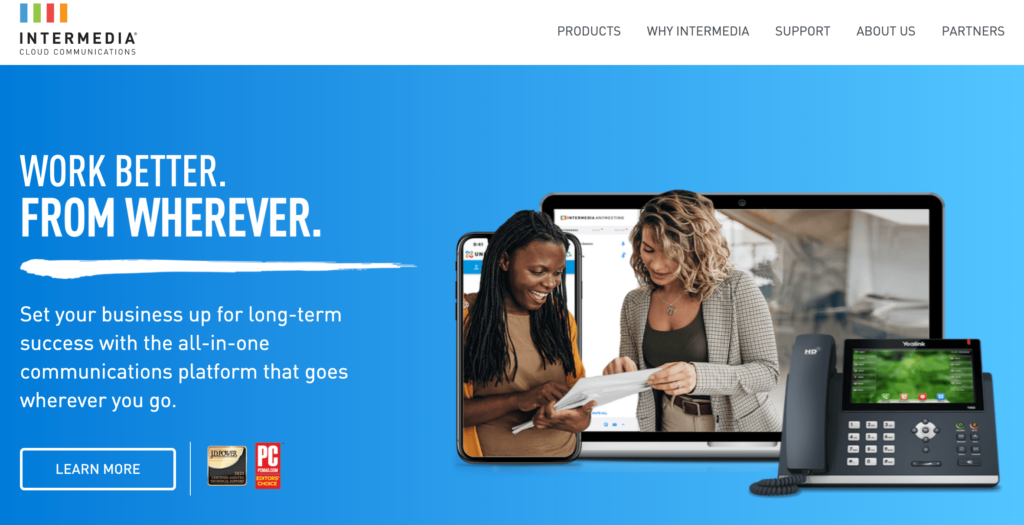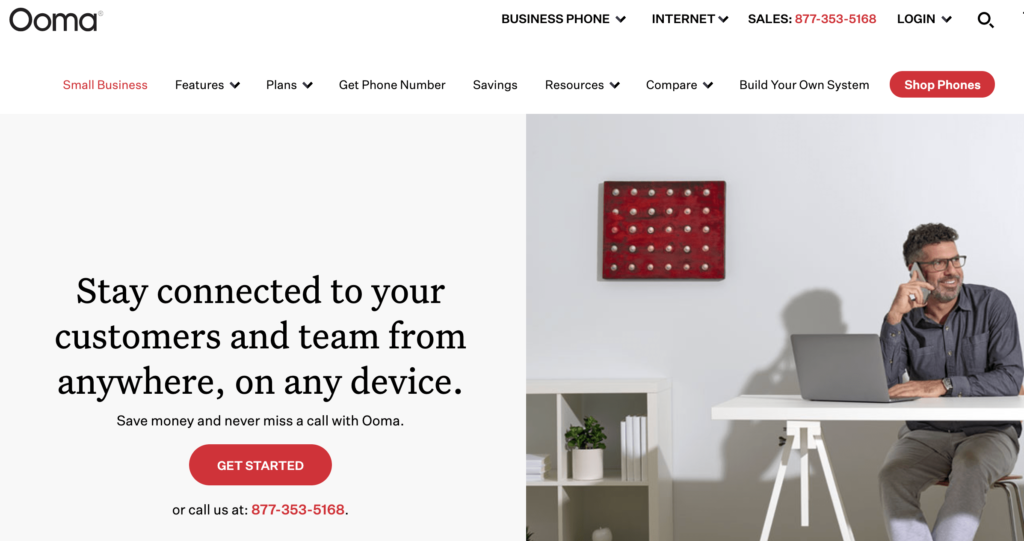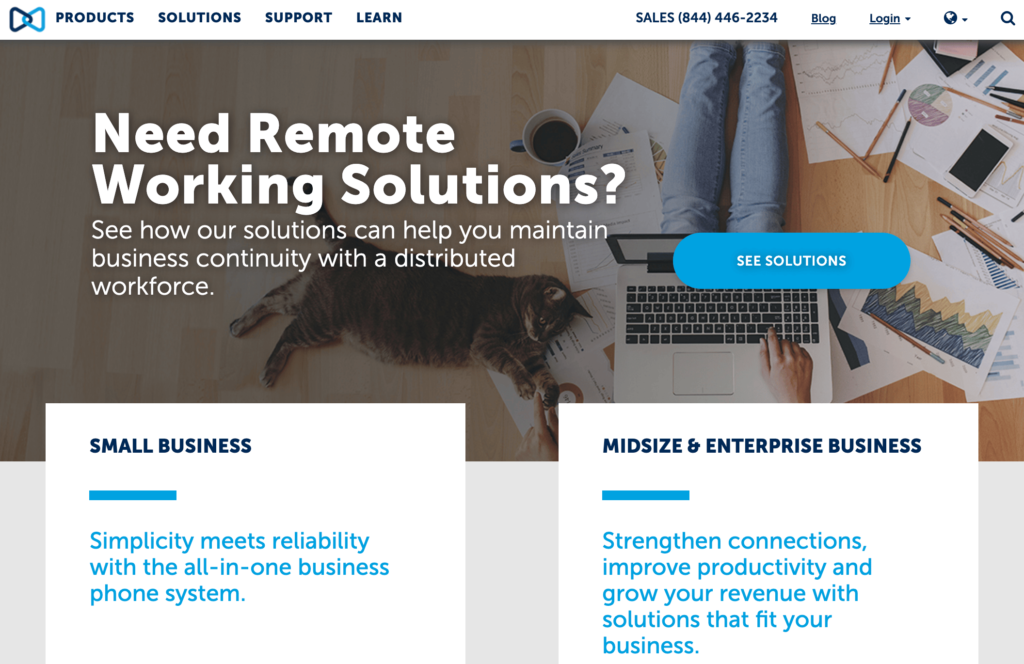VoIP phone communication is growing in popularity, especially in the business world. These cloud-based business phone systems make it easy for organizations to cut down on phone costs and scale without limits.
But a quick search for an internet phone system will likely yield two results—fixed VoIPs and non-fixed VoIPs.
If it’s your first time going through this process, you probably have some questions. This guide will shed some light on the differences between fixed VoIPs and non-fixed VoIPs while helping you find the best option for your unique situation.
What is a Fixed VoIP?
VoIP (voice over internet protocol) phone systems place calls through the internet, as opposed to a traditional landline.
While your VoIP phone number is hosted in the cloud, the number associated with a fixed VoIP is tied to a physical address. In contrast, a non-fixed VoIP is not attached to any physical address/location.
Generally speaking, fixed VoIPs are more reputable for business use. Lots of scammers and fraudulent callers use non-fixed VoIP because it’s easier to hide their identities.
5 Tools to Improve Fixed VoIP
Now that you understand the difference between a fixed VoIP and non-fixed VoIP, it’s time to take a closer look at some actual solutions. These are my favorite fixed VoIP tools on the market today.
Tool #1 — RingCentral

RingCentral is one of the most reputable, reliable, and popular VoIP phone services in existence. Over 400,000 companies across the globe rely on RingCentral for business communications.
This provider offers basic VoIP business phone systems, contact center solutions, and all-in-one product suites for voice, video conferencing, and team messaging. The plans are affordable, easy to deploy, and simple for anyone to use.
The fixed VoIP service from RingCentral is much more secure than a non-fixed VoIP. Since the numbers are tied to a physical address, the experience will be similar to a traditional landline regarding how others perceive the number. Even if you’re making and receiving calls from a smartphone or computer, there still must be a physical address linked to your RingCentral account if you want a fixed VoIP phone system.
RingCentral even supports E911 (enhanced 911) dialing in case there’s an emergency in the workplace. You won’t have this option with a non-fixed VoIP.
Tool #2 — CallHippo

CallHippo is a cloud-based virtual phone system designed for business use. The provider offers local and toll-free numbers in 50+ different countries. With CallHippo, you can sign up and get started in less than three minutes.
This business phone service is perfect for organizations that want to lower their monthly phone bill while having the ability to scale as needed. If you switch to a CallHippo fixed VoIP phone package, you can replace your landline and benefit from enterprise-grade security and emergency services.
Another reason why I recommend CallHippo so highly is because the VoIP phone plans are feature-rich. They offer advantages like power dialing, smart call forwarding, call transfers, conference calls, call queuing, call recording, call barging, hold music, and so much more.
You’ll even have access to call analytics to help track your team’s performance with information like the percentage of missed calls and each agent’s call capacity.
CallHippo is perfect for startups and small teams. But they even offer customized enterprise solutions for larger organizations with advanced needs.
Tool #3 — Intermedia

Intermedia is a unified cloud communications system for businesses. This provider helps organizations communicate from anywhere, from the office to homes, coffee shops, and everywhere in between. They offer enterprise-grade cloud PBX phone systems, video conferencing solutions, integrated chat, screen sharing, file collaboration, and so much more.
The phone system is reliable, scalable, and helps keep costs low. Intermedia even provides industry-specific solutions in healthcare, manufacturing, legal services, financial services, and high-tech.
More than 120,000 organizations of all sizes rely on Intermedia for phone communication. With 20+ years in business, it’s no surprise that Intermedia has such an outstanding reputation in the VoIP phone service industry.
Another unique standout of Intermedia is their exceptional support. Their agents are available 24/7 if you ever have a question or need some assistance. They’ll also help you with the onboarding process as you’re moving to the cloud.
Every Intermedia service comes with a 99.999% uptime SLA (service level agreement). So it’s a company you can count on.
Tool #4 — Ooma

Ooma is one of the best VoIP phone services for small businesses on the market today. According to their website, Omma saves companies 50% on average compared to their current phone bill.
You’ll get a free phone number when you sign up for an Ooma plan, and you’ll even have the option to keep your existing number. One of the many reasons to love Ooma is its simplicity. You can get up and running in less than 15 minutes; no technical experience is required.
There are essentially two plans for small businesses from—Ooma Office and Ooma Office Pro. The entry-level package comes with a toll-free number, Ooma mobile app, and 35 business features like virtual fax, virtual receptionist, SMS messaging, overhead paging, extension-to-extension dialing, and more.
Upgrade to the Pro version for video conferencing, call recording, enhanced call blocking, and the Ooma Office desktop app. You’ll also benefit from higher usage limits for extension monitoring, call parking, and more.
Tool #5 — Mitel

Mitel is a telecommunications company that offers an extensive list of product offerings to businesses. They have all-in-one business phone systems, collaboration tools, and even solutions for remote work.
One of Mitel’s unique standouts is that the company genuinely has services to accommodate businesses of all sizes. So, whether you’re a small business, mid-size organization, or enterprise, you can rely on Mitel for your VoIP phone service.
With Mitel’s all-in-one VoIP service, you’ll benefit from team collaboration, text messaging, video conferencing, and more. I like Mitel because they have plans to support CRM integrations, which is perfect for sales teams, marketers, and customer support agents. Some of Mitel’s advanced features include on-demand call recording, always-on call recording, archiving, and an operator.
Mitel also gives you the ability to mix and match users on multiple plans to help you manage costs more efficiently. So not every user needs to have the most expensive package with the most advanced features. This capability is unique compared to other VoIP business phone services on the market today.
The Basics of Fixed VoIP
Let’s take a closer look at precisely what a fixed VoIP offers. Below I’ll break down the core components of any fixed VoIP phone service.
Manage Calls From Anywhere
Even though a fixed VoIP is associated with a physical address, the calls don’t necessarily come directly from that location. Here’s what I mean. Let’s say you deploy a business phone service using a fixed VoIP, and sign up with your office address.
If you use your VoIP provider’s mobile app or web app, you can still make and receive calls from your home, on the road, or anywhere with an internet connection. So, you’ll have the freedom to manage work-related calls, regardless of your location.
All of the best business VoIP phone systems have some version of a mobile app. In some instances, your team might prefer desktop software or the web-based version of the system. But regardless of the system you’re using, you won’t be tied to a physical desk or location—even though an address is attached to your number.
Emergency Services
A significant downside of a non-fixed VoIP is the inability to dial 911 effectively. Since non-fixed VoIPs are not associated with an address, responders won’t know the location. Any delays in emergency assistance can be a huge problem; whether for a fire, robbery, health issue, or something else, a timely response could be the difference between life and death.
But the best fixed VoIP phone service providers offer basic 911 or E911 (enhanced 911) dialing to help protect your business in the event of an accident or an emergency. Otherwise, you’d have to tell your staff to use their personal devices to dial 911. But during an emergency, people panic and don’t always think to do that.
Security
Top-tier and enterprise-grade security are typically associated with fixed VoIP services. In addition to keeping data safe and calls encrypted, fixed VoIPs offer an extra layer of protection that you won’t get with a non-fixed VoIP. Here are some examples to show you what I mean.
Non-fixed VoIPs are commonly used by criminals and fraudsters to scam people. But your employees would think twice about doing something illegal with your company phone number if they know that it can easily be traced back to them. That’s not the case with a non-fixed VoIP. Your staff could use that number and essentially remain anonymous.
Furthermore, the chance of your number getting stolen with a fixed VoIP is slim. You’re purchasing the number, and it’s registered to an address—unlike a non-fixed VoIP that lives in the cloud with no home.
Business Features
Another significant advantage to a fixed VoIP compared to traditional phone service is that you’ll have access to business-grade features. The vast majority of VoIP phone services offer more than just a basic phone line. In addition to the ability to make and receive calls from anywhere, you can opt for an all-in-one communication suite.
These packages typically come with tools for internal team chat, video conferencing, and more. There are solutions for customer messaging, SMS messaging, call centers, sales teams, marketers, and support agents—the list goes on and on. Business users can choose a plan with features like call recording, call barging, virtual fax, CRM integration, and other tools designed to improve your service quality.
Call analytics and reports are helpful as well. Managers and supervisors can use these reports to better understand how well their agents are performing.
International and Long Distance Calling
Fixed VoIPs do support international calling. However, it’s usually more expensive to make international calls with a fixed VoIP than a non-fixed VoIP.
Lots of people rely on non-fixed VoIPs for personal use to call friends and family overseas. It’s affordable and sometimes free.
But for business use, you’re much better off using a reliable fixed VoIP. Even if it’s a bit more expensive, you don’t want to call your clients or customers using a non-fixed number that could appear untrustworthy.
3 Tricks For Fixed VoIP
Before you start using a fixed VoIP, check out my favorite tricks, quick hacks, and best practices below.
Trick #1: Keep Your Existing Phone Number
If you’re currently using a traditional phone line for your business, you should be able to keep that number (if you want to) when switching to a fixed VoIP. The best VoIP business phone services should make this process fairly easy for you. Just verify that they offer this option before you sign up.
Don’t cancel your old phone service or DSL service until the number has been completely ported over to your VoIP phone line. Be prepared to provide a recent bill, your service address, and more information to make this process as seamless as possible.
Trick #2: Run a VoIP Speed Test and Quality Test
Before you make the switch to a fixed VoIP, you need to make sure that your existing internet connection can support VoIP calling. The easiest way to do this is with a simple VoIP speed or quality test.
These tests typically take less than one minute to complete. Use the test to determine if your internet speeds and other crucial metrics meet the recommended requirements of the VoIP phone service. There are lots of ways to do this online. You do this for free on RingCentral’s website. But there are dozens of other viable free alternatives on the web too.
If your internet connection is unstable, you’ll need to upgrade your plan or switch providers before signing up for fixed VoIP phone service.
Trick #3: Don’t Buy New Equipment
There’s no reason to go out and buy new phones or other costly hardware. With a fixed VoIP, you and your staff alike can make and receive calls directly from your existing devices.
All you need is a desktop computer, laptop computer, or a smartphone. As long as you’re in an area with an internet connection, you can use your VoIP phone service. Some providers do offer phones, headsets, and other hardware. In most cases, that’s optional. Only buy that hardware if it’s something that you prefer. But generally, you won’t need it.
from Quick Sprout https://ift.tt/3qy74ot
via IFTTT
No comments:
Post a Comment